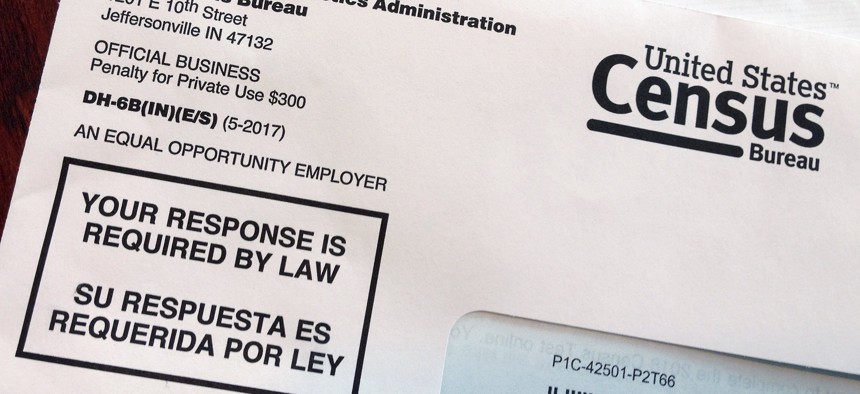Connecting state and local government leaders
It’s one of several legal battles over the Trump administration’s controversial decision to ask about citizenship on the 2020 census.
Fifteen Republican state attorneys general are urging the U.S. Supreme Court to side against over two dozen states and local governments battling with the Trump administration over the inclusion of a question about citizenship status on the 2020 census.
The legal dispute is one of several unfolding in federal courts around the U.S. in the wake of Commerce Secretary Wilbur Ross’ decision last March to approve adding a question to the population survey that will ask if respondents are citizens of the United States.
At issue in the Supreme Court case is whether legal challenges brought under the federal Administrative Procedure Act allow for lawyers to obtain evidence outside of “the administrative record,” to help them gain insight into the thinking of agency decision makers.
In this case, the question took on significance because it concerned whether Ross and other high-level officials could be deposed as part of legal proceedings.
The Supreme Court issued an order in October that blocked the plaintiffs who filed the lawsuit from questioning Ross. But the court didn’t prevent them from deposing John Gore, who was previously the acting head of the Justice Department’s civil rights division.
A bench trial in the case, before Judge Jesse Furman of the Southern District of New York, concluded on Nov. 27, following attempts by the federal government to halt proceedings. Democratic attorneys general were among those that spearheaded the court challenge.
Those opposed to the citizenship question—including the states and localities that filed the lawsuit last April that led to the Supreme Court case—have argued that adding the question to the upcoming census will undermine the accuracy of the once-a-decade headcount.
The thinking goes that asking about citizenship threatens to deter participation in immigrant communities concerned about how the federal government might use the information, raising the prospect of undercounting in locations with large immigrant populations.
That could be consequential for those places, because the census helps to guide the distribution of billions of dollars in federal funding, as well as the allocation of congressional representatives for each state and members of the Electoral College.
But in a brief filed late last month with the Supreme Court, the Republican attorneys general argue that including a citizenship question in the census would yield benefits for their states by providing data that would help them comply with the federal Voting Rights Act.
They also say that when legislators determine districts based on population, without accurate statistics on citizenship, “legally eligible voters may have their voices diluted or distorted.”
And they contend that not shielding high-level federal officials from subpoena requests like the one in the case would set a “dangerous precedent” that would open the door for litigants in other cases to use similar tactics against senior state government officials.
“If this Court should permit the deposition of a federal cabinet officer in order to ascertain his subjective motives in making a commonplace administrative decision, that would open the floodgates for similar depositions and subpoenas against state officers,” their brief says.
The Commerce Department is at the center of the controversy over the question because it houses the U.S. Census Bureau.
When the Commerce Department revealed last year that the bureau was planning to ask census respondents about their citizenship status, the announcement said the decision followed a request from the Justice Department, and that the question would help enforce the Voting Rights Act, which is designed to prevent voter discrimination.
But later it came to light that Ross and other administration officials had discussed including the question prior to the DOJ request.
Other cases that center on the question are scheduled for trial in federal court this month.
The state of California and local governments there are involved in one of the legal challenges, which is unfolding in a U.S. District Court in San Francisco. The bench trial in that case, before Judge Richard Seeborg, is scheduled to begin on Jan. 7.
Meanwhile, residents of Maryland and Arizona have registered their opposition to the question in a case pending in a Maryland federal court. A trial in that case is set to kick off on Jan. 22. Judge George Jarrod Hazel is overseeing it.
In both those cases, the federal government asked for proceedings to be delayed due to the ongoing partial federal government shutdown, which is affecting the Justice Department.
But both judges denied those motions.
Additional legal disputes are pending over the question as well, including one that involves advocacy groups representing minorities and immigrants—such as La Union Del Pueblo Entero, the Georgia Association of Latino Elected Officials, the Organization of Chinese Americans of Greater Houston and the California Asian Pacific Islander Legislative Caucus.
The attorneys general who signed onto the Supreme Court brief in favor of the Commerce Department are from Oklahoma, Arkansas, Alabama, Florida, Georgia, Indiana, Kansas, Louisiana, Michigan, Montana, Nebraska, South Carolina, Texas, Utah, and Colorado.
The high court is set to hear the case on Feb. 19.
Decennial census surveys have asked citizenship-related questions on and off in past decades, up until 2000, according to the federal government’s court filings in the case.
Beginning in 2005, the bureau began collecting citizenship data through what’s known as the American Community Survey, which is sent to about one-in-38 households each year.
Bill Lucia is a Senior Reporter for Government Executive's Route Fifty and is based in Washington, D.C.

NEXT STORY: ‘Peace Cross’ Case Could Affect Hundreds of Monuments, States Say




